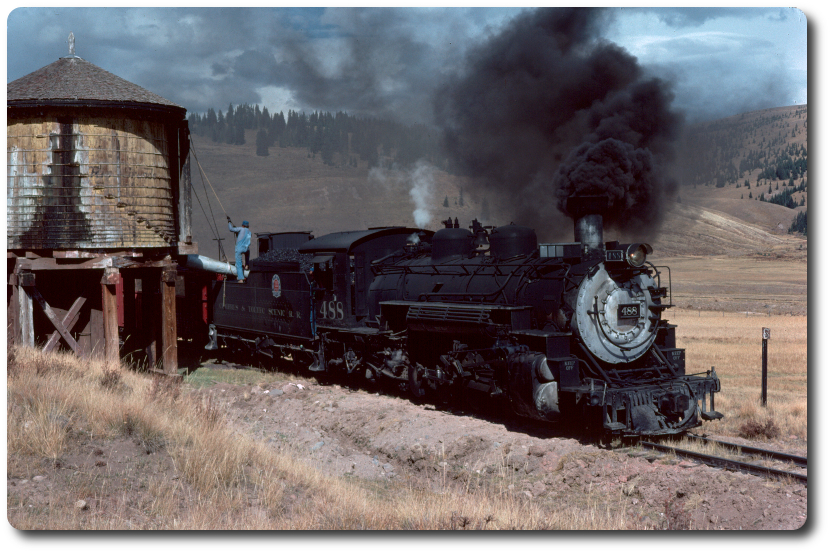Joe Weigman Wrote:
-------------------------------------------------------
>
> I can't say any of the Durango Elementary schools
> I attended offered a ride on the D&S. Still, I
> remember the idea was at least entertained when I
> was in 4th grade at Sunnyside Elementary, south of
> Durango a bit.
>
> Hell, many of them have never been to Silverton or
> even know that the "Choo Choo Train" goes to
> Silverton in the first place, and I highly doubt
> they ever will find out for themselves. Unless
> they manage to fulfill the surprisingly popular
> opinion of moving to LA when they're older, there
> is no doubt in my eyes that they will heavily
> contribute to the anti-train mob growing here in
> Durango.
Joe makes some excellent points here, and I’ve highlighted just a couple of them. I’m betting many school groups ride the railway, and visit many of the other tourist lines in the nation, but how many tourist lines have developed formal programs for schools.
I think I’ve mentioned I had a long career with a watershed management agency. Fully 25 years of that was managing our outdoor education programs - five nature centre facilities, under formal contract with six regional school boards, visited by 50,000 kids per year. Experiential education is a powerful learning tool - aka learning by hands-on activities. Some parents would come out with their kids and recall the exact program they participated in as students 20 years before. Yikes, some days I can’t remember what I had for breakfast! Learning by “doing” outstrips textbooks and lectures any day.
And our philosophy wasn’t just to teach kids about the environment. We felt that people who learn more about our river become more appreciative of its value, more concerned about its health, and supportive advocates of our programs when thorny issues arise. Does this sound like something that could benefit tourist railways? And school programs are a good investment because remember, in the long term these school “kids” will grow up to become the future community decision makers.
The same applies to our tourist railways, which unlike their Class 1 counterparts can be a gentler and more integral part of their community, and increase public support at all levels through school programming. Larger tourist lines can do this in a concerted way, but to be of real value school trips can’t just be a day off school to ride the choo-choo. Our success and value to school boards was that every program was tailored to specific grades, and ticked off “outcomes” as outlined in the formal provincial (state) curriculum.
And for railways, these outcomes don’t need to be confined to the obvious subject areas of history and transportation. As a cross-curriculum example, even cursory thought can develop teachable outcomes in English/language. Railroad terminology can be a huge area, and how often are we frustrated by public who don’t know the difference between a steam engine and a diesel, or a freight train from a passenger train. Maybe it’s our fault. Even terms we take for granted like ties, spikes and couplers are a mystery, but all such terminology is fodder for inclusion in an elementary level school program.
Other curriculum areas can include exercises in mathematics (what was the speed of the train between mileposts x and y, what percent was the grade, how much do all the passengers on the train weigh). Or physics for older grades (how does a steam loco work, what is steam pressure, how do the brakes work, etc). Or geography (the origin of place names along the way), geology (I understand the C&TS has aced this), economics (how many people does the railway employ, how much taxes does it pay) - the list is endless.
For implementation you need a knowledgeable tour guide that doesn’t just list off boring dates and locomotive types (we called our staff “Interpreters”). You need activity sheets for the kids to fill out, age-appropriate participatory activities, and ways to encourage teacher participation. All these and more are ways to make the experience directly curriculum related. Meetings with the school board can help vet your materials, get the board or staff department heads on board (literally and figuratively - host them on an annual trip!), and get them to promote your program with the individual teachers. This, coupled with a favourable fee structure, can boost ridership in the off season, and give your public a closer look at the railroad’s present day role in the community.
And if the experience is the same that our nature centres had, parents often accompany their kids on trips, so you’re reaching the present generation as well as the next. And speaking of the next generation. Many of our staff got their initial exposure to the environment through their school nature centre visits. This lead to post-secondary education in an environmental field, and eventually employment with us. The wheel turns full circle.
Anyway, sorry for the length. Just food for thought, and thanks for your insights Joe and others.
Cheers,
Ralph
Edited 3 time(s). Last edit at 10/18/2020 05:12PM by tgbcvr.



